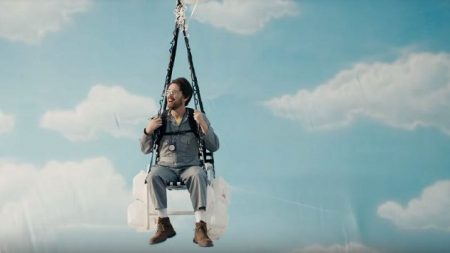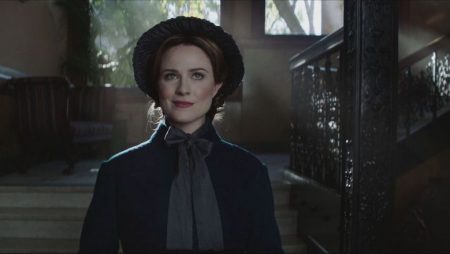Incongruity, Immanuel Kant once observed, is an essential element of humor. “In everything that is to excite a lively convulsive laugh there must be something absurd (in which the understanding, therefore, can find no satisfaction). Laughter is an affectation arising from the sudden transformation of strained expectations into nothing.”
Such comedic insight may very well lay behind American comedian Derek Waters’s Emmy-winning series Drunk History (Funny or Die, 2007; Comedy Central, 2013), a tipsy twist on the historical docudrama that infuses the form with generous amounts of alcohol.
The concept is straightforward enough: in each episode, guest storytellers – usually comedians or comedy writers – have a few drinks with Waters and attempt to tell an historical tale while a company of costumed actors and a guest star or two earnestly pantomime the narrator’s history, warts belches and all.
The most recent episode (aired June 18, 2019), for example, presented a parody of Ripley’s Believe It Or Not, in which the comedian Doug Jones told the story of Lawnchair Larry (Colin Hanks) and his 1982 DIY aircraft flight, Allan McLeod recounted the strange tale of Phineas Gage (Steve Agee), and Jennie Pierson recalled the 1897 case of the Greenbriar Ghost with the help of performances by Sara Rue and Taran Killam (“Everyone’s a nightmare in the 1800’s,” Pierson laughs at one point).
I first encountered Drunk History about ten years ago during its first iteration as a series of webisodes produced by Will Ferrell and Adam McKay’s Funny or Die. A bit rough around the edges compared to the polished TV version, the first batch of seven episodes had an experimental, viral video quality to them – absurdist parody, middling production values, scatological humor, and a lot of barfing.
That one could see Michael Cera and Jake Johnson playing Alexander Hamilton and Aaron Burr in a muddled retelling of their famous duel; or Don Cheadle as Frederick Douglass, Ferrell as Lincoln, and Zooey Deschanel as Mary Todd in an episode about the friendship between the Great Emancipator and the great abolitionist, enhanced its shareability.
But, to me at least, the idea seemed too weird to continue beyond a handful of 4 to 7-minute YouTube clips. I was delighted, therefore, when Comedy Central picked up the series in 2013 for an initial eight-episode run. The series has since been on the air in the U.S. for six seasons, while a U.K version of the show has had three.
Over the years, Waters and his team have managed to keep the show fresh – and eminently bingeworthy – by extending their historical repertoire beyond familiar “Great Man” stories to include marginalized and underrepresented historical experiences. Stonewall, the Occupation of Alcatraz, the suffrajitsu movement, the 504 Sit-in, the history of birth control, and the Little Rock Nine have all received the Drunk History treatment.
Drunk History has also continued to book an impressive range of talent.
The premiere installment of the current sixth season, for example, featured a star-studded cast in a retelling of Frankenstein according to sozzled storyteller Rich Fulcher. Dubbed “Are You Afraid of the Drunk?,” the episode included performances by Elijah Wood (as Percy Shelly), Jack McBrayer (Lord Byron), Seth Rogen (Victor Frankenstein), Will Ferrell (The Monster), and Evan Rachel Wood, whose energetic portrayal of Mary Wollstonecraft Godwin (a name Fulcher continued to stumble over, much to Wood/Godwin’s growing impatience) Waters has said he considers one of the series’ best.
“I always said the whole tone of the show was taking ridiculousness seriously,” Waters recently told IndieWire, “the words said are so naturally insane, but how she [Wood] responds, how she plays it, it’s Shakespeare.”
The novelty of seeing such well-known actors as Wood, Winona Ryder, Topher Grace, Jack Black, Octavia Spencer, Maya Rudolph, or John Lithgow give physical expression to the historical ramblings of shit-faced storytellers is all part of Drunk History’s special charm.
But it’s also didactic strategy. As Waters once told NPR’s Steve Inskeep, “I hate to be the bearer of bad news, but overall, history’s pretty boring. But history is very important … and I believe if you can make someone laugh, you can secretly make them learn something.”
If otherwise dry material is presented in an entertaining and playful way, the theory goes, its viewers might actually retain something.
This idea of playing with history by putting it in the hands of drunk comedians calls to mind sociologist Roger Caillois’s conception of games of vertigo (ilinx), which typically involve movements of rapid rotation, acceleration, gyration, or swinging and are intended to provoke a sense of disorientation “inflict[ing] a kind of voluptuous panic on an otherwise lucid mind.” Caillois thinks of such activities as riding a roller coaster, or walking a high wire, playing leapfrog, skiing, or certain kinds of dance (we could very well add drinking alcohol to this list), in which we derive pleasure from the destabilizing sense of perception – of reality – that they produce.
Essential in such activities, Caillois writes, “is the pursuit of this special disorder or sudden panic, which defines the term vertigo, and in the true characteristics of the games associated with it: viz. the freedom to accept or refuse the experience, strict and fixed limits, and separation from the rest of reality.”
Importantly for Caillois, such play also implies a subversive moral dimension, a “desire for disorder and destruction, a drive which is normally repressed.”
Consumption of alcoholic beverages has, of course, long been the subject of moral prescription. Indeed, it would be unsurprising to learn that, for viewers, part of the pleasure of watching Drunk History is that it flouts codes of social propriety by celebrating a state of inebriation that is typically associated (in the U.S. at least) with personal moral failing and usually kept from public view.
Instead, we as viewers revel in the altered perception of reality presented by Drunk History storytellers – the temporary upending of ordinary social life and of our received conceptions of what “history” is. We become sympathetic, not only because we may have found ourselves in a similar state of inebriation at one time or another, but also because of the genuine sense of interest and passion that the storytellers bring to their stories; we laugh at the incongruity between vertiginous narration and the earnest – but inevitably frustrated – acts of mimicry (For Caillois, the “being or passing for another”) performed by the reenactors.
Of course, Drunk History is hardly the first to hit upon the comedic potential of using alcohol as historiographical lubricant. In a beloved 1930 essay, the American humorist James Thurber imagined what it would have been like if Ulysses S. Grant, commanding general of the U.S. Army at the end of the Civil War, had been drunk when accepting Robert E. Lee’s surrender at Appomattox in 1865. (When prompted by an aide, the bleary Grant presented his sword to an astonished Lee, and declared “There you are, General … we dam’ near licked you. If I’d been feeling better we would of licked you.”)
But it is the sense of passion and personal investment, I believe, that Drunk History makes its most significant contribution to popular history.
Rather than continuing in the “boring,” “dry-as-dust” formulation by which many Americans, including Waters, recall their own historical education, drunk historians attempt to bridge the felt distance between past and present – a distance maintained by professional standards of objectivity – by rendering moral judgment (albeit wacky, drunken ones) on the histories they narrate.
In the third episode of the web series, for example, the comedian Jen Kirkman tells the story of Oney Judge (Tymberlee Hill), a fugitive slave once owned by George and Martha Washington (Danny McBride and Marianna Palka), after drinking a bottle and a half of wine. Describing how Washington rebuffed Judge’s impassioned plea that her children be spared from the requirements of the new Fugitive Slave Act of 1793 – in which it was stipulated that the children of fugitive slave mothers were property of their mother’s masters – Kirkman explained that, “In Washington’s fucked up, wooden teeth, white haired, powdered wig, goddamned male chauvinist world, this fucking ass is like, ‘No … that wouldn’t be appropriate. That wouldn’t be the law,’ or whatever his fake law was.”
While a professional historian might analyze racial and gendered hierarchies in American society in the eighteenth century (See, for example, Kathleen M. Brown’s Good Wives, Nasty Wenches, and Anxious Patriarchs: Gender, Race and Power in Early America), typically they tend to avoid the kind of personal opinion and presentism displayed with such gusto by Kirkman and other drunk historians.
For professional historians, superimposing contemporary values – however well meaning – onto the past is anachronistic, and inevitably distorts our understanding of historical actors and their social worlds by introducing a bias in favor of the culture of the present.
In contrast, such anachronisms are part of the fun of Drunk History. They are an essential element of the incongruity between our expectations of abstract historical knowledge and the interpretation presented by Waters and his storytellers.
For Drunk History, the past is meant to be engaging and personal. And though the series presents little in the way of structural analysis, and can shy away from exploring the connections between the events of the past and the pressing social and political issues of today (i.e., those that might inform progressive or emancipatory activism), it does allow us to reassess our understanding of historical knowledge, its special social role, and its popular appeal from a new, slightly tipped perspective.
At the same time, however, through its laughter, Drunk History risks even greater abstraction, reinforcing the idea that the past is a foreign country, and that its problems and issues (the things they do differently there) leave no burdens for the present.
Andrew J. Salvati earned his Ph.D. in Media Studies at the Rutgers-New Brunswick School of Communication and Information in May 2019. His research centers on the ways in which American history has been presented in popular media, including television, film, podcasts, mash-ups, and computer games. His dissertation, “Small Screen Histories: Presenting the Past on American Television, 1949-2017” examines the ways in which the producers of historical documentaries and docudramas construct “usable pasts” that speak as much to the concerns of the present as they do to the past. His work has also appeared in the journals Rethinking History and the Journal of Radio and Audio Media.









